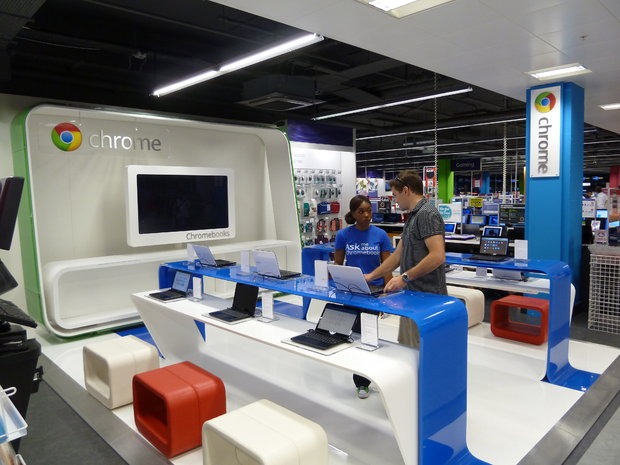Google Is Poised To Revolutionize Consumer Retail
Infrastructure professionals are now all too familiar with the dynamics of bring-your-own (BYO) technology and devices: Their workers walk into the office with consumer technology all the time. This post is one in a continuing series on how consumer retail stores act as de facto extensions of the IT department in today's BYO world.
The rumors have abounded for more than six months: unconfirmed whispers that Google will open up its own major chain of consumer retail stores. The company has dipped its toes into the retail waters with Chromebook-focused kiosks in the U.S. and the U.K. over the past few years, with installations inside larger retailers like Best Buy, Dixons, and Currys.
A Google Kiosk in the U.K.: Not Yet Reaching Revolutionary Heights

Yet while kiosks – particularly those staffed by Google employees – offer some value in promoting Google’s products and services, the company has a much greater opportunity for late 2013 into 2014. Kiosks aren't going to foment a retail revolution. To quote the popular Star Wars geek meme, "these aren't the droids you're looking for."
No, it's time for Google to think big – to go gangbusters. To do something nobody has done as well previously. Why is this imperative?
First, Google's competitors have already established their beacheads within the consumer retail space. Apple leads the market with its wildly profitable Apple Stores. These stores represent a top strategic asset for Apple, allowing the company to build entirely new product categories; without the Apple Store, there would have been no iPad. The Apple Store is simultaneously a social space for brand aficionados; a laboratory for product training; a high-quality service desk; and a discovery mechanism for new products.
Samsung rolled out a promising – if less ambitious – store-within-a-store concept this year. Using its own personnel, Samsung will articulate a brand experience and show the interoperability of its many lines of products – a puissant strategic move. Meanwhile, Microsoft is taking over the PC department of Best Buy, a necessary gambit but one fraught with perils.
Now it’s Google’s turn. And if Google lives up to its promise, the company can revolutionize consumer retailing in a way no company has since Apple. But they have to do it right… yet Google isn’t always the most patient organization, and its hyper-political decision-making can create pathologies.
Let’s say they do it right: What can the Google retail revolution entail?
- Leading with the breakthrough product – Google Glass. Although the beta product has attracted its critics – including derisive fashion critiques, paranoid privacy denunciations, and flat-out skepticism about its value, make no mistake: Google Glass or something like it will become a mainstay of computing. For Google to make this work, they need a transformative, magical retailing experience – one suited to the idiosyncrasies of the product and one that can explain to prospective buyers why it’s revolutionary — and how to use it. Glass alone can make the Google Store a destination, like a Tesla Store.
- Bringing together its formidable product and services ecosystem – but avoiding pet projects. Google offers an incredible array of hardware outside of Glass: Nexus 4, 7, and 10 Android devices; Chromebooks of various (and growing) stripes; the almost too good to be true Chromecast device; and the entire OEM ecosystem of Android phones and tablets from partners like Samsung and HTC. Services, too, are key: Using ultra-exciting 4K displays with augmented reality to allow buyers to walk through Picassa, Youtube, and Google Earth experiences would turbo-charge the value of the brand and offer its hardware offerings a halo effect. Save these experiences in the cloud for the shopper to replay on her own device at home. To be avoided, though? Fads, i.e. the products that wind up in the graveyard of dead Google products.
- Revolutionizing in-store experiences with digital methods. Who knows more about you than Google? Google can ride a variety of waves to mine your personal information to (literally) point you to the right areas of its stores. Using location-based technologies, it can create in-store experiences that consumers have never seen before. Google can change the large screen displays you walk by in store – a la Minority Report – to personalize your visit. Google can push promotions to your smartphone, allow you to bring your own tablet for interactive experiences, and let you try out any app in Google Play. And the whole store could use robotic sales associates (as an adjunct to real ones), powered by Google Now.
All of these ideas are possible with Google’s deep pockets, portfolio of products and services, and technological prowess. Do they have the managerial chops to make such a gigantic splash, and shake up the retail world?
J. P. Gownder is a vice president and principal analyst at Forrester Research serving Infrastructure & Operations Professionals. Follow him on Twitter at @jgownder.
